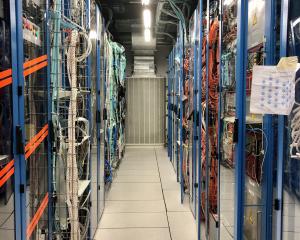So be honest, some of you rolled your eyes when the team of five million was called upon to be kind.

Kind: defined in my dictionary simply as, thinking of others. Recently Covid knocked on my door. Despite escaping prior close calls, our number was drawn and we settled in for some family bonding time while we juggled the working from home, Zoom meetings, school and lecture schedules.
My favourite four-legged friends celebrated the news and took up residence in the home office.What became apparent to me very quickly was the response to my predicament.
Offers were immediate and wide-ranging, importantly including coffee. Homemade florentines appeared in my mailbox along with an oximeter to give me reassurance as a mother.
Offers of grocery runs and pickups from work were intermingled with well wishes and advice of good binge watching should I be the unlucky bedridden one for days on end.
And indeed I was the unlucky one in the house. Covid well and truly made its presence felt and I found myself in the unenviable position of juggling a very full workload while being well beyond the "just a bit of a cold" that so many of my peers recorded Covid as.
The good news as a result (and trust me in the middle of it I had to dig pretty deep to find any), is I am now more empathetic as it continues to rip through others in my world.
This is important as it’s too easy to be somewhat dismissive based on our own personal experience. Indeed, an experienced director said exactly that to me as we tried to converse over an urgent matter one Saturday in the middle of it all (with me barely able to hold the other side of the conversation).
That’s the thing about being a director — urgent and important don’t always align with your own personal needs.
So in addition to being empathetic, Covid serves as a powerful reminder to not overboard. This was a well-discussed theme in 2020 when Covid hit, but is always worth reflecting on from time to time before you make or renew a commitment.
Things are OK when everything is good, but when challenges collectively combine, the juggle is very real.
Now recovered, and watching another round alongside general winter ills, it reminds me to take time to actively reflect on the approach taken by entities to their employees and their customers.
I’ve seen a range of responses, from those that organise simple but thoughtful care packages (it’s always nice to know your work family are thinking of you when you’re feeling miserable), to space carved out, no meetings over lunchtime and meeting-free Fridays, all designed to help with the juggle at home (which with kids, is real).
Workloads reshuffled, working from home policies updated, welfare calls made, call centres temporarily closed while FAQ webpages are stood up instead. Actions that speak to employees being cared for and valued.
How about your policies around customers? Health orders provide the guard rail guidance but values and leadership drive the standards and experiences we seek while preserving the bottom line.
I will keep saying it, we scream safety but whisper health. Are you are whisperer when it comes to your employees’ wellness? Or do you have a megaphone and lead from the front?
Is your stance contemporary in this tight labour market or merely a collection of a flu jab here and domestic and Covid leave there? Did you debate what the return to work looked like across your employee demographics?
While some could not wait to get out of their bedrooms in a flat of six for the social banter by the water cooler, for others the return to work and the daily grind of childcare drop-offs and pick-ups precisely on a schedule is real.
Overlay that financial and emotional cost with the real impacts of inflation as it hits transportation, and the inflexible workplace seems to lose some of its charm.
Rules-based frameworks may have been de rigueur in days gone, but the most important asset on your balance sheet will always be your people.
And as anyone who has tried to employ anyone recently will know, how you approach your work environment and the culture you seek may determine whether you get your preferred candidate or not.
Ask yourself this, are your employees coming to work in order to build culture, to creatively solve problems and to collaborate?
Or are they coming because your rules said so and its easier to control and monitor outputs when everyone is in the same space? What really is making your workplace a positive and a special place to work?
If you can’t answer these questions then maybe its time to dust off your employee value proposition at your next people, remuneration and culture committee.
That’s all great, Trish, if you are part of the laptop class, I hear you say. Fair comment. Life does look somewhat different if you are responsible for road crews, tradies, hospitality or retail, run an airline, operate a port or anyone basically in the group we called essential services.
Their view of managing Covid is somewhat different to mine and on that I offer three simple words: respect, empathy and patience.
How your organisation chooses to approach and interact with entities that can’t as easily transition to the home office and are running short on staff warrants consideration.
So sure, roll your eyes again if you must but in my opinion, there is something to be said for organisations that celebrate culture, creativity and collaboration among their people.
So regardless of sector, consider bringing your megaphone along to the next board meeting and magnify the call around your people and how they interact with others.
- Trish Oakley is chairwoman of the Otago-Southland branch of the Institute of Directors (IOD). This article is opinion only and not intended as governance advice. IOD is the professional body for directors and is at the heart of New Zealand’s governance community.












